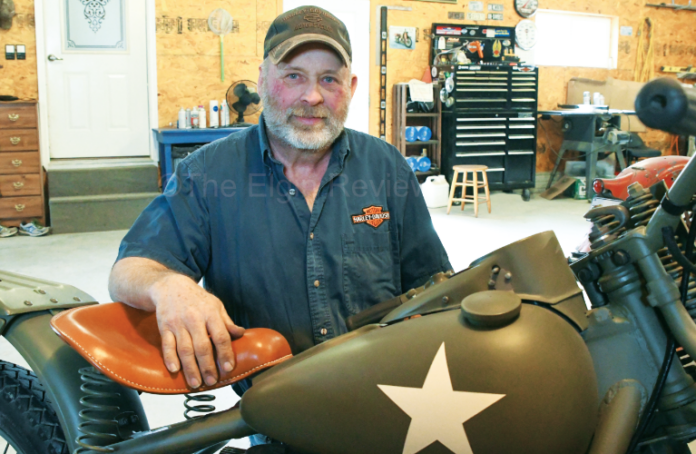
By Jane Schuchardt
Special to The Elgin Review
Vroom. Vroom. That’s the sound of a revved-up motorcycle ready to hit the road. Many riders crave the long haul. Not so for Elgin native Jim Meis.
His passion is restoring that vintage mean machine, right down to minuscule detail. Then he savors its majesty, parks it, and trailers it down the road for competition.
Nope, not for a race. Instead, the goal is to rebuild the two-wheeler to its original state, just as it came out of the crate, brand-spanking new. Wife Anne of 35 years proudly pulls out a plaque from the Antique Motorcycle Club of America (AMCA) from a 2022 competition in Fremont. Recounting his first attempt with a 1942 cycle, Meis exclaimed, “Ninety-five points out of 100, and it has to run for 30 seconds.”
This motorcycle, complete with a gun holder, was prototyped by the U.S. Army to traverse sandy terrain in WWII, he described. The idea was dropped in favor of a jeep. According to a like-minded motorcycle enthusiast in Germany who keeps a registry, “There are 124 (out of 1,024 made originally) left in existence. It has no chain, so it could be used in the desert.”
At the competition, the judge is in a room with the motorcycle, by herself (in this case, it was a woman), and goes over every detail. The docking of five points was for a crack in the headlight, a missing bolt behind the seat, and no rubber on the foot pedals. It has one mile on the odometer.
Meis said he heard about this particular motorcycle growing up from his father, also named Jim, who bought one at age 15. “This is not the one Dad bought,” Meis said.
Lest you think he found his current prized possession in one piece, ready for some bolt tightening and a paint job, think again. “Through the Internet, I meet people (and buy parts and pieces) from all over the world – Poland, Czechoslovakia, Germany, Canada, Australia, other places,” he said. “One person knows someone else and finally, several people down the road, I find a part.”
Meis, attired in a Harley-Davidson cap and shirt, admired his machine which, in this case, took six years to restore. Mostly a winter endeavor and wrap-around to farming other seasons, he said, exhibiting his quiet, humble demeanor, “I like to do the research, find the parts, get it to run, and put it under a blanket.”
For the rest of the story, see this week’s Elgin Review.



